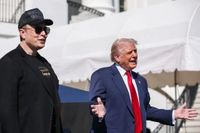On April 2, 2025, the U.S. magazine Politico reported that Elon Musk is set to end his role as a close government partner within Donald Trump's inner circle. Despite President Trump expressing satisfaction with Musk and his initiative, the "Department of Government Efficiency," both men have decided it is time for Musk to step back and focus on his businesses. This transition comes amidst growing concerns regarding Musk's political influence and its impact on his companies.
According to sources close to the situation, Trump informed his cabinet and inner circle that Musk will resign from his advisory role in the coming weeks. This decision, while not entirely unexpected, has sparked significant speculation about its implications for both Musk and Tesla. Following the announcement, Tesla's stock saw a notable increase, jumping from $266 to $280 in a matter of minutes.
While this surge in stock price may seem like a positive development, some analysts are wary. They suggest that even if Musk steps down from his political role, his previous support for Trump has already tarnished Tesla's brand image. Many former Tesla customers have reportedly switched to competitors due to Musk's controversial political stances, and it is unlikely they will return simply because of a change in Musk's role.
The stock market's reaction was not limited to Tesla. Other government-related service providers, including CACI International, Booz Allen Hamilton, Leidos, and Science Applications International, also experienced stock price increases ranging from four to nine percent following the news of Musk's impending withdrawal.
However, the backdrop to Musk's departure is not entirely rosy. Reports have surfaced indicating that Tesla's deliveries fell by approximately 13 percent year-on-year in the last quarter, attributed to a model change and ongoing controversies surrounding Musk. During the first quarter of 2025, Tesla managed to deliver 336,681 vehicles, a figure that fell short of analysts' expectations.
In particular, the numbers from Europe have been alarming. Tesla's new registrations in the European Union plummeted by 49 percent in the first two months of 2025 compared to the previous year, totaling just over 19,000 vehicles. Germany, a significant market for Tesla, saw new registrations drop dramatically from 6,038 vehicles in February 2024 to just 1,429 in February 2025. Furthermore, preliminary figures indicate that Tesla's sales in China also fell by more than eleven percent in March.
Musk's political involvement has drawn increasing criticism over the past months. Despite Trump's satisfaction with Musk, the tech billionaire's role as a close ally has sparked controversies. Critics have accused Musk of making reckless budget cuts and of making inflammatory statements regarding various political issues. For instance, he has controversially claimed to have thrown the U.S. Agency for International Development (USAID) "into the woodchipper" and has made unfounded allegations of widespread fraud in government funding.
Moreover, Musk's political views have alienated some potential Tesla customers. In Germany, he publicly supported the far-right Alternative for Germany (AfD) party before the federal elections and has also engaged in political discussions in the UK. His comments about perceived racism against white people and claims that U.S. Democrats are manipulating elections by bringing in foreigners have further fueled backlash against him.
At a recent event for Trump's inauguration, Musk shocked attendees with a gesture reminiscent of a Nazi salute, which he later dismissed as a "dirty trick" by his opponents. Such incidents have only intensified calls for boycotts against Tesla, with protests occurring at Tesla locations in various countries.
As Musk prepares to step back from his political role, the future of Tesla remains uncertain. While the stock market appears to react favorably to the news of his withdrawal, the underlying issues of declining sales and damaged brand reputation loom large. The impact of Musk's political affiliations and controversial statements continues to resonate in the marketplace, leaving many to wonder whether Tesla can recover its former glory.
In summary, Elon Musk's impending departure from his role as a close advisor to Donald Trump marks a significant shift in both his personal and professional landscape. While the stock market excitement suggests optimism, the challenges facing Tesla, particularly regarding sales and public perception, are far from resolved. As Musk returns to focus on his companies, the question remains: can Tesla regain its footing in an increasingly competitive electric vehicle market?


